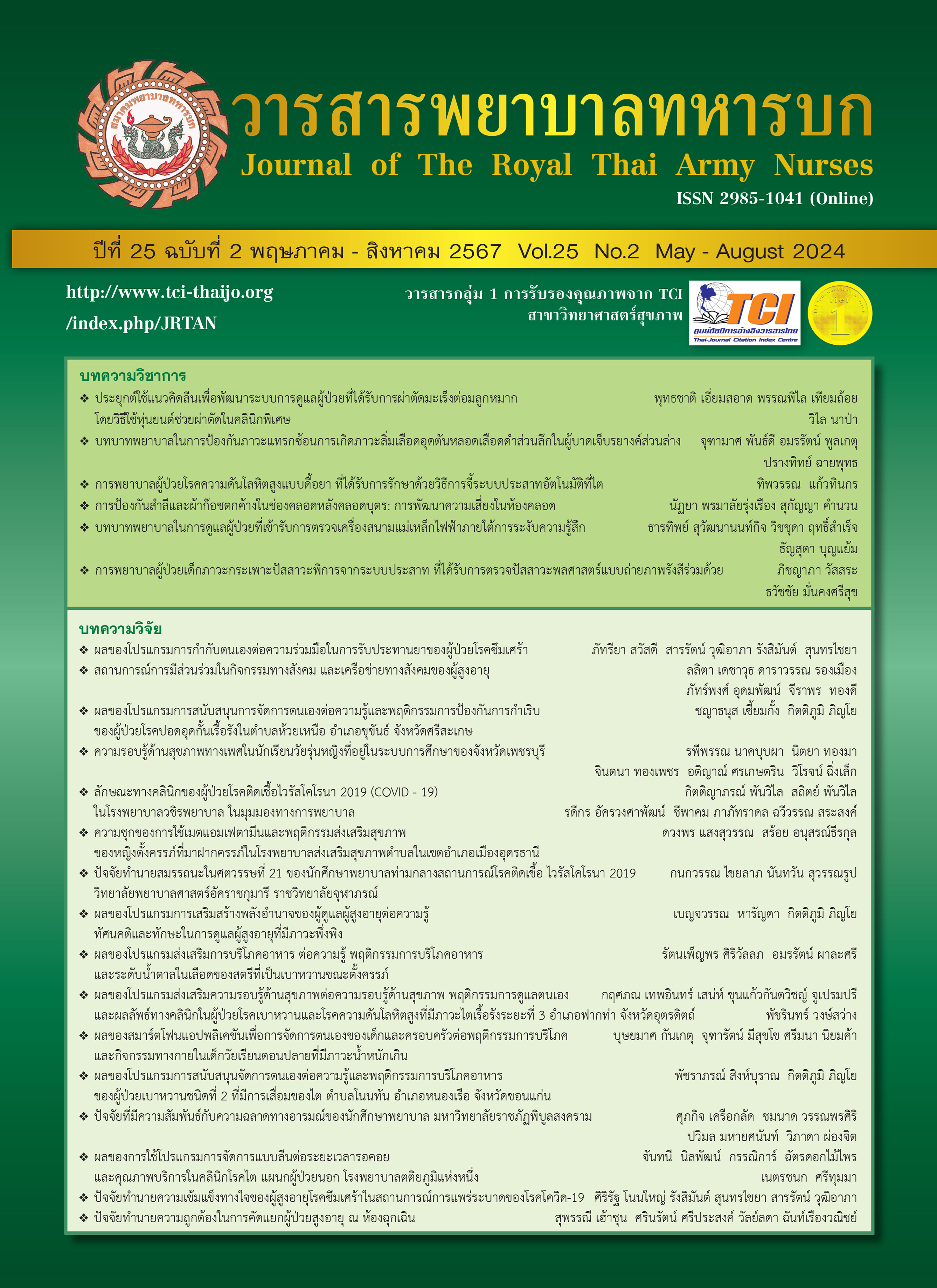Predictive Factors of Resilience among Older Adults with Major Depressive Disorder During Covid-19 Pandemic
Keywords:
Resilience, Older adults with depressive disorder, COVID-19Abstract
This objective of predictive correlation research was aimed at examining predictive factors of resilience among older adults with major depressive disorder during the Coronavirus disease 2019 (COVID-19) pandemic. Samples were 137 older adults with major depressive disorder who were treated at the psychiatric outpatient clinic of the hospitals. Multi-stage random sampling technique was used. Seven instruments were used to collect data: 1) demographic questionnaire; 2) Depressive Symptom Inventory for Thai Older Persons with depressive disorders; 3) Stress Test Questionnaire; 4) Geriatric Anxiety Scale; 5) Family Support Scale; 6) COVID-19 Preventive Health Behaviors Questionnaire; and 7) Connor–Davidson Resilience Scale (Thai version). For the instruments 2-7, Cronbach’s alpha coefficient reliability was .91, .79, .87, .91, .95, .91 respectively. Data were analyzed by descriptive statistics, and multiple linear regression analysis.
Results were as the following: Anxiety had the highest statistically significant negative correlation with sample resilience (r = -.467, p < .01), followed by depressive symptoms (r = -.428, p < .01), stress (r = -.409, p < .01). COVID-19 preventive health behavior had the highest statistically significant positive correlation with resilience (r = -.399, p < .01), followed by family support (r = .340, p < .01). Two factors of depressive symptoms and COVID-19 preventive health behavior could account for predicting resilience at 47.3%
Recommendations: To promote preventive health behavior and family support; as well as to decrease depressive symptoms, stress, and anxiety would increase resilience among older adults with major depressive disorder.
Downloads
References
Niu S, Tian S, Lou J, Kang X, Zhang L, Lian H, Zhang J. Clinical characteristics of older patients infected with COVID-19: A descriptive study. Archives of Gerontology and Geriatrics 2020;89(1): 104058.
Wang C, Pan R, Wan X, Tan Y, Xu L, Ho CS, et al. Immediate psychological responses and associated factors during the initial stage of the 2019 coronavirus disease (COVID-19) epidemic among the general population in China. International journal of environmental research and public health 2020;17(5): 1-25.
Armitage R, Nellums LB. COVID-19 and the consequences of isolating the elderly. The lancet public health 2020;5(5): e256.
Foundation of Thai Gerontology Research and Development institute (TGRI). Situation of the thai elderly 2020. Nakhon Pathom: Institute for population and social research mahidol university; 2021. (in Thai).
Phothisiri W, Buathong T, Bangkaew B. The impact of COVID-19 on older Persons in thailand. Bangkok: Chulalongkorn university printing house; 2021. (in Thai).
Kar, N. Managing mental health issues among elderly during COVID-19 pandemic. Journal of Geriatric Care and Research (JGCR) 2020;7(1): 32-5.
Pearman A, Hughes ML, Smith EL, Neupert SD. Age differences in risk and resilience factors in COVID-19-related stress. Journals of gerontology - series b psychological sciences and social sciences 2021;76(2): e38–e44.
Kimhi S, Eshel Y, Marciano H, Adini B. Distress and resilience in the days of COVID-19: Comparing two ethnicities. International Journal of Environmental Research and Public Health 2020;17(11): 1–11.
Burke-Garcia A, Johnson-Turbes A, Mitchell EW, et al. How Right Now ? Supporting Mental Health and Resilience Amid COVID-19. Traumatology 2021;27(4):399-412.
Waelveerakup W, Suwannasarn K, Pasuwan D. Quality of life of Older Persons During the Second Wave of the COVID-19 Pandemic in Thailand. Journal of The Royal Thai Army Nurses 2023;24(2):76-87. (in Thai).
Li F, Luo S, Mu W, Li Y, Ye L, Zheng X, et al. Effects of sources of social support and resilience on the mental health of different age groups during the COVID-19 pandemic. Biomedcentral Psychiatry 2021;21(1):1-14.
Connor KM, Davidson JR. Development of a new resilience scale: The connor-davidson resilience scale (CD-RISC). Depression and Anxiety 2003;18(2): 76–82.
Soonthornchaiya R, Kongsuk T, Arunpongpaisal S, Wisetrit W, Sukhawaha S, Leejongpermpool J. The development and construct validity testing of depressive symptom inventory for thai older persons with depressive disorders. The Journal of Psychiatric Nursing and Mental Health 2018;32(2): 100-12. (in Thai).
Phongphanngam S, Phromkaewngam S, Chantawang S, Nawai A, Yottavee W. Thai Geriatric Anxiety Scale: Psychometric Properties of the Ten-item Short Form (Thai GAS-10). The Southern College Network Journal of Nursing and Public Health 2021;8(3): 61-71. (in Thai).
Nakwijit S. Psycho-social factor related to self-care behavior and happiness of the senior citizen club members in the hospitals under medical service department. [Master’s Thesis, Applied behavioral science research]. srinakharinwirot university; 2008. (in Thai).
Maneein N, Duangchinda A. Perceived SelfEfficacy and Preventive Health Behaviors with Coronavirus Disease 2019 among the Elderly in U-Thong District, Suphan Buri Province. Journal of council of community public health 2021;3(2): 1-18. (in Thai).
Vongsirimas N., Thanoi W., & Yobas PK. Evaluating Psychometric Properties of the Connor–Davidson Resilience Scale (10-Item CD-RISC) among University Students in Thailand. Nursing Science Journal of Thailand 2017;35(3): 25-35.
Wise T, Zbozinek TD, Michelini G, Hagan CC, Mobbs D. Changes in risk perception and self-reported protective behaviour during the first week of the COVID-19 pandemic in the United States. Royal Society Open Science 2020;7(9): 1-13.
Álvarez MA, Pinto NS. Experiential COVID-19 factors predicting resilience among Spanish adults. Biomedcentral Psychol 2023;11(1):1-10.
Perez-Rojo G, López J, Noriega C, et al. A multidimensional approach to the resilience in older adults despite COVID-19. Biomedcentral Geriatr 2022;22(1): 1-7.
Lee K, Jeong GC, Yim J. Consideration of the Psychological and Mental Health of the Elderly during COVID-19: A Theoretical Review. International journal of environmental research and public health 2020;17(21): 1-11.
Vannini P, Gagliardi GP, Kuppe M, et al. Stress, resilience, and coping strategies in a sample of community-dwelling older adults during COVID-19. Journal of psychiatric research 2021;138(1):176-85.
Killgore WDS, Cloonan SA, Taylor EC, Dailey NS. Loneliness: A signature mental health concern in the era of COVID-19. Psychiatry research 2020;290(1): 1-2.
Downloads
Published
How to Cite
Issue
Section
License
Copyright (c) 2024 Journal of The Royal Thai Army Nurses

This work is licensed under a Creative Commons Attribution-NonCommercial-NoDerivatives 4.0 International License.
บทความหรือข้อคิดเห็นใดใดที่ปรากฏในวารสารพยาบาลทหารบกเป็นวรรณกรรมของผู้เขียน ซึ่งบรรณาธิการหรือสมาคมพยาบาลทหารบก ไม่จำเป็นต้องเห็นด้วย
บทความที่ได้รับการตีพิมพ์เป็นลิขสิทธิ์ของวารสารพยาบาลทหารบก
The ideas and opinions expressed in the Journal of The Royal Thai Army Nurses are those of the authors and not necessarily those
of the editor or Royal Thai Army Nurses Association.






